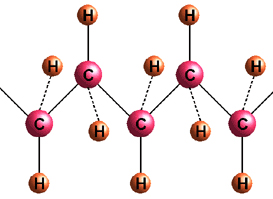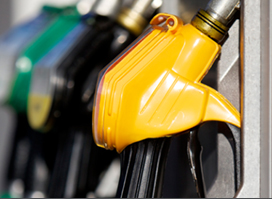







By motor gasoline is meant a mixture of the lighter fractions of petroleum composed of hydrocarbons having boiling points in the range approximately 30 0C to 215 0C.
Straighfluidizet run stream from Crude Distillation Unit (CDU) and cracked stream from d Catalytic Cracker Unit (FCCU) with the above boiling range are blended to obtain required quality Motor Gasoline.
It may contain small quantities of chemical e.g. tetraethyl lead, etc. added to improve its performance.
A diesel fuel is any fuel suitable for burning in diesel or compression ignition engines. Petroleum diesel fuels may be distillates or blends of distillates and residual fuels.
In a compression ignition engine, air alone is drawn into cylinder and compressed until it is very hot (about 500 deg C). At this stage, finely atomized fuel is injected at a very high pressure, which is ignited by the heat of compression and hence the term compression ignition (C.I.). A spark ignition engine on the other hand, relies upon a carburetor to supply into the cylinder a mixture of gasoline vapour and air, which after compression, is ignited by a spark.
The average compression ratio of a diesel engine is much higher (about 15:1) than that of a gasoline engine (about 8:1) and this is the reason for the higher thermal efficiency of the diesel engine (about 33% as compared to about 25% of the gasoline engine) which makes for economy in operation.
Octane rating or octane number is a standard measure of the performance of an engine or aviation fuel. The higher the octane number, the more compression the fuel can withstand before detonating (igniting).
In broad terms, fuels with a higher octane rating are used in high performance gasoline engines that require higher compression ratios. In contrast, fuels with lower octane numbers (but higher cetane numbers) are ideal for diesel engines, because diesel engines (also referred to as compression-ignition engines) do not compress the fuel but rather compress only air and then inject the fuel into the air heated up by compression.
Gasoline engines rely on ignition of air and fuel compressed together as a mixture without ignition, which is then ignited at the end of the compression stroke using spark plugs. Therefore, high compressibility of the fuel matters mainly for gasoline engines. Use of gasoline with lower octane numbers may lead to the problem of engine knocking.
Octane rating or octane number is a standard measure of the performance of an engine or aviation fuel. The higher the octane number, the more compression the fuel can withstand before detonating (igniting).
In broad terms, fuels with a higher octane rating are used in high performance gasoline engines that require higher compression ratios. In contrast, fuels with lower octane numbers (but higher cetane numbers) are ideal for diesel engines, because diesel engines (also referred to as compression-ignition engines) do not compress the fuel but rather compress only air and then inject the fuel into the air heated up by compression.
Gasoline engines rely on ignition of air and fuel compressed together as a mixture without ignition, which is then ignited at the end of the compression stroke using spark plugs. Therefore, high compressibility of the fuel matters mainly for gasoline engines. Use of gasoline with lower octane numbers may lead to the problem of engine knocking.